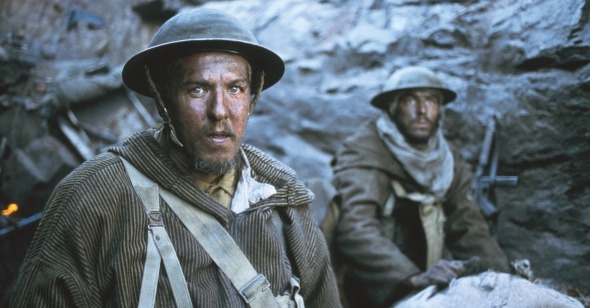General Issue
by Michael Joshua Rowin
Days of Glory (Indigènes)
Dir. Rachid Bouchareb, France/Algeria, The Weinstein Company
“At the 2006 Cannes Film Festival,” boast press and advertising materials for Days of Glory, “One film was so powerful it changed the course of history.” The change in question came with audience member Jacques Chirac’s re-instatement of pensions to “indigènes,” North African fighters who served the French Army during WWII. But by portraying the bigotry and inequality four soldiers encounter while liberating France Rachid Bouchareb’s Academy Award–approved war drama (nominated this year for Best Foreign Language Film) addresses the past with only a nod to the complications of the present. Beyond the men directly benefiting from Chirac’s action and generated public awareness of these veterans’ sacrifice, “the course of history” the film seeks to alter will most likely proceed without it.
Bouchareb’s essential aim is to detail the conditions under which Algerian, Tunisian, and Moroccan Muslims fought and lived in the Army. Saïd (Jamel Debbouze) becomes a white soldier’s lackey and then discovers his superior is also Muslim; Messaoud (Roschdy Zem) falls in love with a white woman, but is cut off from her when the Army censors his letters; Abdelkader (Sami Bouajila) realizes the extent of the Army’s disregard for his countrymen’s accomplishments and actively opposes its racist policies. Admirable as bringing this untold historical episode to light is, Days of Glory bungles the delivery, displaying little restraint in doling out the clichés of its genre for short-lived, unthinking effect—this is the sort of film that concludes far too many scenes with one character throwing another against a wall in response to some insulting salvo. There’s even a “Why, God, Why?” moment when one character’s brother is killed by a booby trap. One doesn’t wish to laugh, especially when fictionalized events bear semblance to real ones, but it’s difficult to take this sort of hackneyed portrayal of war seriously. Surely the North African soldiers have unique, personal stories to tell about their experiences of discrimination, subordination, and combat; yet Bouchareb and screenwriter Olivier Lorelle expect them to fit snugly into general issue machismo.
Days of Glory’s rote narrative and perfunctory filmmaking have it destined for dismissal, but the contemporary backdrop against which it has been released makes the film, at the very least, a potentially interesting political metaphor. As France still struggles with the ramifications of the 2005 country-wide riots stemming directly from racial discrimination visited upon Muslim immigrants by the police, Days of Glory limns the rift between Western and Muslim worlds—as we’re apt to assign these oppositional poles—by initially gathering up its North African characters in a wave of patriotism and then setting them down in the harsh reality of separate, unequal status. The film ends by echoing Saving Private Ryan, with an elderly Abdelkader circa 2007 visiting the graves of his comrades who heroically fell in a skirmish in which they were grossly outnumbered. Unlike Ryan, however, Abdelkader’s silent meditation in the cemetery and then in his lonely urban tenement doesn’t extend out from personal commemoration to the larger arena of philosophical quandary but instead intends to match the character’s ordeals to today’s racial and religious tensions. Unfortunately, Days of Glory’s lackluster quality and limited scope prevent it from forging specific, pertinent connections—the contained issues it addresses are related yet still a ways from the messy racial and political landscape of contemporary France.
